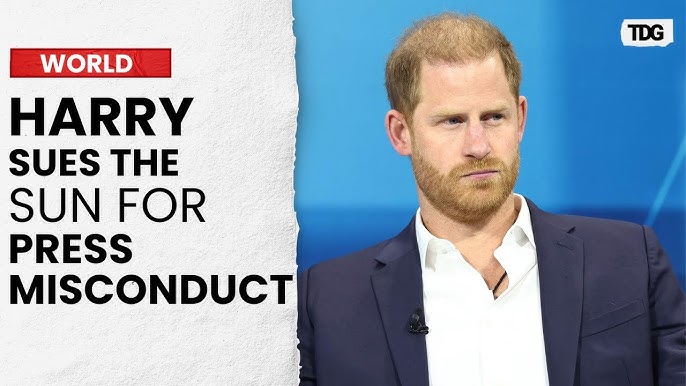In the coming weeks, Prince Harry is set to enter a high-stakes courtroom showdown against News Group Newspapers (NGN), the media giant owned by Rupert Murdoch.
This lawsuit marks a pivotal moment in Harry’s ongoing battle for justice and accountability against the UK tabloid press, which has relentlessly targeted him and his family over the years.
At the heart of this legal conflict lies Harry’s assertion that NGN unlawfully obtained private information about him through illicit methods such as phone hacking and other deceptive practices.
Harry’s allegations are not unfounded; past cases have revealed that some journalists collaborated with private investigators to gather sensitive information without consent.
The prince contends that the media’s inability to reveal the genuine sources of their information indicates a troubling pattern of invasive tactics.
Complicating matters further is an alleged arrangement between NGN and Prince William, suggesting that William opted not to pursue his own claims against the media in exchange for favorable coverage.
Unfortunately, this deal seemingly did little to shield Harry from the tabloid’s incessant scrutiny.
As he prepares for this costly legal battle, many believe that the public should be grateful to Harry for his courage.
His determination to confront powerful media conglomerates showcases his commitment to justice—not just for himself, but for all who have been victimized by unethical journalism.
Despite the relentless attacks on him, his wife Meghan, and their children, Harry remains resolute in his mission to protect his family’s dignity and privacy.
This legal action isn’t driven by a desire for monetary compensation; rather, Harry seeks a simple acknowledgment of the harm inflicted upon him and his loved ones.
His fight is fundamentally about establishing a precedent that demands accountability from those who misuse their power in the media landscape.
By challenging these practices, Harry is highlighting the urgent need for reform within the UK media, advocating for a system that prioritizes ethical journalism and respects individual privacy.
The tabloids have often strayed from their role as societal watchdogs, opting instead for unethical practices like blackmail and cover-ups to safeguard their interests.
Harry’s case shines a spotlight on these behaviors, emphasizing the necessity for a media environment that serves the public good rather than its own agenda.
In doing so, he is not only advocating for his family but also for the integrity of journalism as a whole.
As Harry gears up for this trial, he is returning to the UK to confront NGN, which owns major British tabloids such as The Times and The Sun.
His lawsuit centers on the alleged unlawful acquisition of personal information, raising serious questions about privacy rights and the ethical obligations of journalists.
With NGN historically spending vast sums to settle similar claims quietly, Harry’s decision to pursue this case openly signals his commitment to transparency.
The trial aims to uncover how the tabloids accessed private information that should have remained confidential.
It seeks to identify the methods employed and the individuals involved in these unethical practices.
If successful, this could lead to significant repercussions for those who have violated privacy laws, setting a new standard for future media conduct.
Moreover, the alleged agreement between the Palace and NGN—where Prince William supposedly secured positive coverage in exchange for dropping his own hacking claims—adds another layer of complexity to the situation.
Should this arrangement be substantiated, it would expose a troubling dynamic between the Royal Family and the media, revealing why Harry has faced disproportionate scrutiny compared to his brother.
The negative portrayal of Harry in the press has had profound effects on both his personal and professional life.
However, this legal battle transcends financial restitution; it represents a broader fight against the pervasive unethical practices that plague the media industry.
Harry’s actions are a clarion call for reform, advocating for a media landscape that values privacy rights and ethical reporting.
Despite facing intense backlash from the tabloids, which have ramped up their attacks since his lawsuit was announced, Harry remains undeterred.
His determination to seek justice is palpable, as he continues to advocate for change in the media’s approach to reporting.
He is not merely fighting for himself; he is championing a cause that resonates with many who have suffered due to media abuses.
The public response to Harry’s stand has been overwhelmingly supportive, with many rallying behind him in solidarity.
His courage has sparked conversations about media ethics, prompting calls for greater accountability within the industry.
As he navigates this complex legal landscape, Harry’s fight for justice may very well pave the way for a more responsible and ethical media environment, benefiting not just celebrities but everyone subjected to the whims of tabloid culture.
